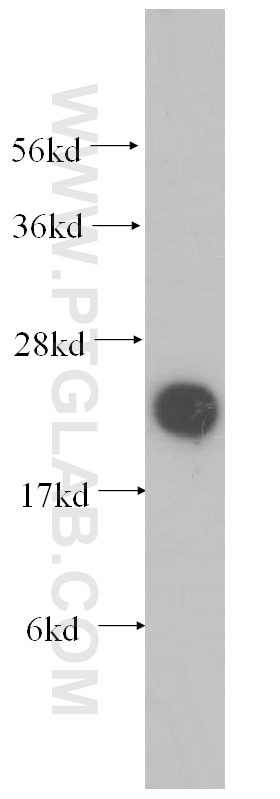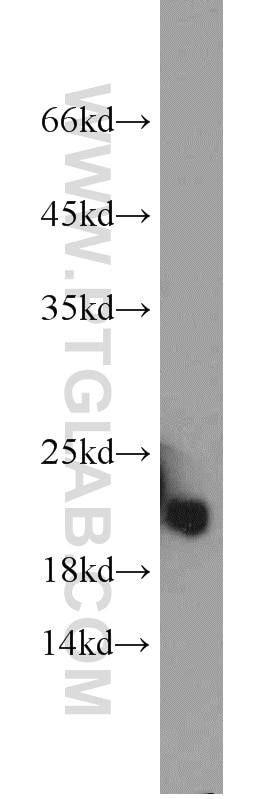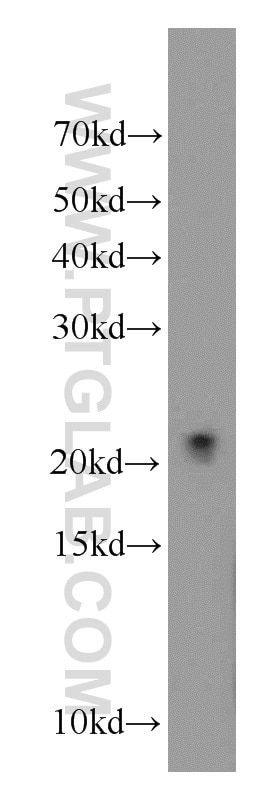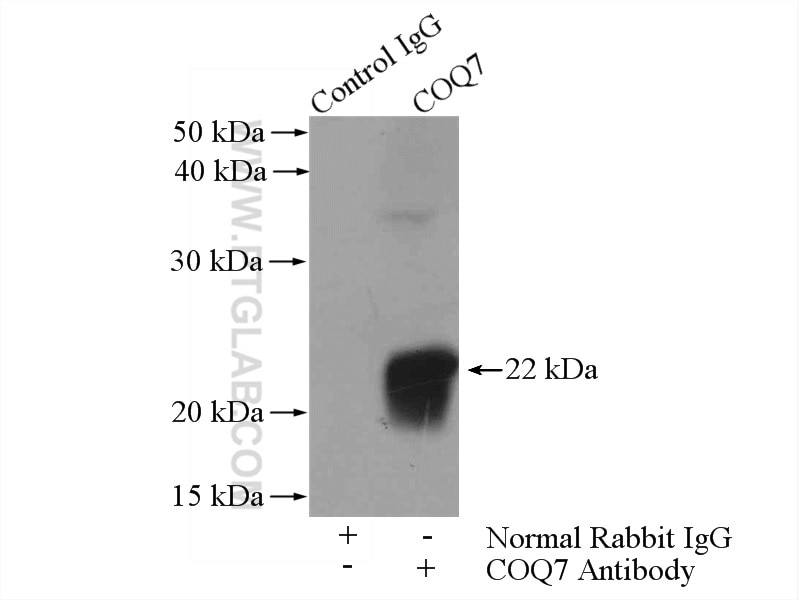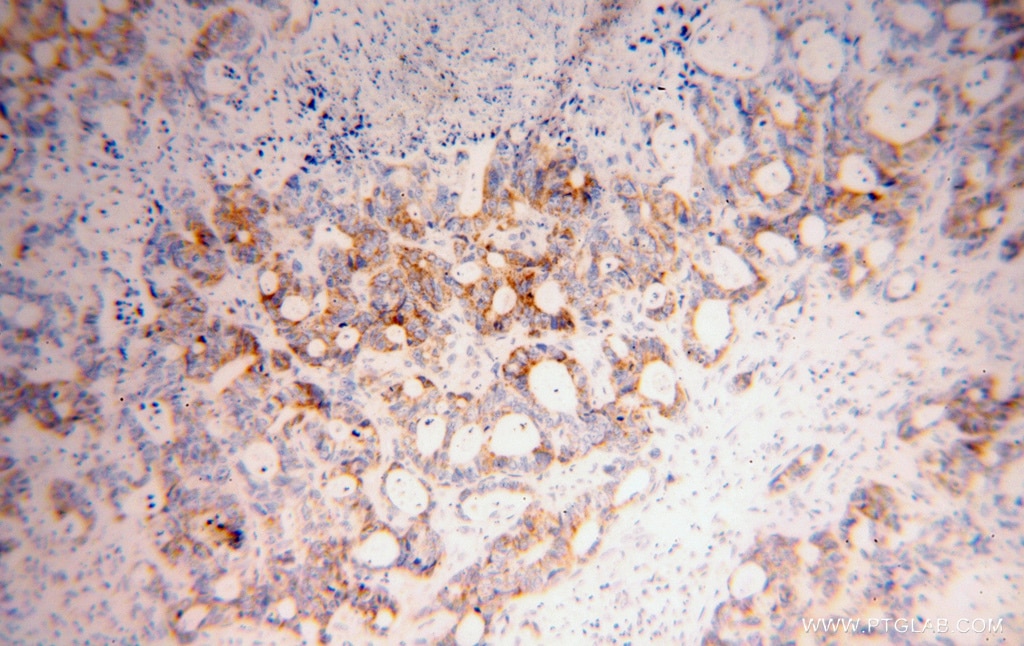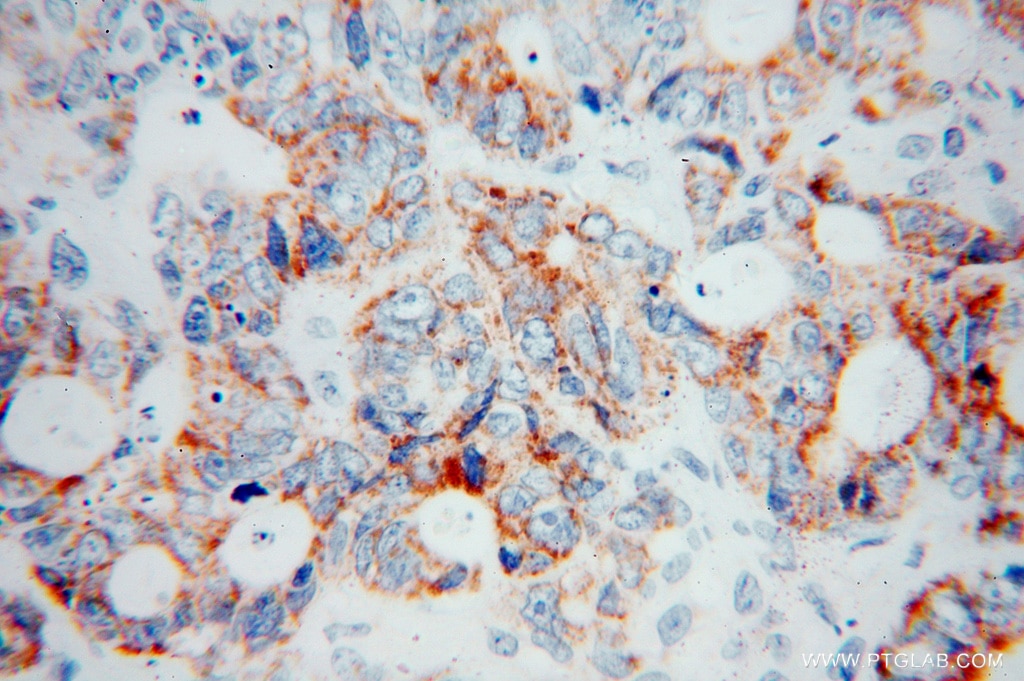- Phare
- Validé par KD/KO
Anticorps Polyclonal de lapin anti-COQ7
COQ7 Polyclonal Antibody for WB, IP, IHC, ELISA
Hôte / Isotype
Lapin / IgG
Réactivité testée
Humain, rat, souris
Applications
WB, IP, IF, IHC, ELISA
Conjugaison
Non conjugué
N° de cat : 15083-1-AP
Synonymes
Galerie de données de validation
Applications testées
| Résultats positifs en WB | tissu hépatique de souris, tissu cardiaque de souris |
| Résultats positifs en IP | tissu hépatique de souris |
| Résultats positifs en IHC | tissu de cancer du foie humain il est suggéré de démasquer l'antigène avec un tampon de TE buffer pH 9.0; (*) À défaut, 'le démasquage de l'antigène peut être 'effectué avec un tampon citrate pH 6,0. |
Dilution recommandée
| Application | Dilution |
|---|---|
| Western Blot (WB) | WB : 1:500-1:1000 |
| Immunoprécipitation (IP) | IP : 0.5-4.0 ug for 1.0-3.0 mg of total protein lysate |
| Immunohistochimie (IHC) | IHC : 1:20-1:200 |
| It is recommended that this reagent should be titrated in each testing system to obtain optimal results. | |
| Sample-dependent, check data in validation data gallery | |
Applications publiées
| KD/KO | See 4 publications below |
| WB | See 21 publications below |
| IF | See 1 publications below |
Informations sur le produit
15083-1-AP cible COQ7 dans les applications de WB, IP, IF, IHC, ELISA et montre une réactivité avec des échantillons Humain, rat, souris
| Réactivité | Humain, rat, souris |
| Réactivité citée | rat, Humain, souris |
| Hôte / Isotype | Lapin / IgG |
| Clonalité | Polyclonal |
| Type | Anticorps |
| Immunogène | COQ7 Protéine recombinante Ag7161 |
| Nom complet | coenzyme Q7 homolog, ubiquinone (yeast) |
| Masse moléculaire calculée | 24 kDa |
| Poids moléculaire observé | 22 kDa |
| Numéro d’acquisition GenBank | BC003185 |
| Symbole du gène | COQ7 |
| Identification du gène (NCBI) | 10229 |
| Conjugaison | Non conjugué |
| Forme | Liquide |
| Méthode de purification | Purification par affinité contre l'antigène |
| Tampon de stockage | PBS avec azoture de sodium à 0,02 % et glycérol à 50 % pH 7,3 |
| Conditions de stockage | Stocker à -20°C. Stable pendant un an après l'expédition. L'aliquotage n'est pas nécessaire pour le stockage à -20oC Les 20ul contiennent 0,1% de BSA. |
Informations générales
COQ7(Ubiquinone biosynthesis protein COQ7 homolog) catalyzes the production of coenzyme Q (CoQ) in mitochondria. The predicted protein contains 179 amino acids, is mostly helical, and contains an alpha-helical membrane insertion. It has a potential N-glycosylation site, a phosphorylation site for protein kinase C and another for casein kinase II, and 3 N-myristoylation sites. This protein has 2 isoforms produced by alternative splicing with MW 20-24 kDa.
Protocole
| Product Specific Protocols | |
|---|---|
| WB protocol for COQ7 antibody 15083-1-AP | Download protocol |
| IHC protocol for COQ7 antibody 15083-1-AP | Download protocol |
| IP protocol for COQ7 antibody 15083-1-AP | Download protocol |
| Standard Protocols | |
|---|---|
| Click here to view our Standard Protocols |
Publications
| Species | Application | Title |
|---|---|---|
Nat Cell Biol A nuclear role for the respiratory enzyme CLK-1 in regulating mitochondrial stress responses and longevity. | ||
J Clin Invest ADCK4 mutations promote steroid-resistant nephrotic syndrome through CoQ10 biosynthesis disruption.
| ||
EMBO Mol Med β-RA reduces DMQ/CoQ ratio and rescues the encephalopathic phenotype in Coq9 R239X mice. | ||
Redox Biol The Q-junction and the inflammatory response are critical pathological and therapeutic factors in CoQ deficiency. | ||
Acta Pharmacol Sin Dysregulation of iron homeostasis and methamphetamine reward behaviors in Clk1-deficient mice. |
Avis
The reviews below have been submitted by verified Proteintech customers who received an incentive forproviding their feedback.
FH Ying (Verified Customer) (04-26-2021) | It's super clean and works great.
|
